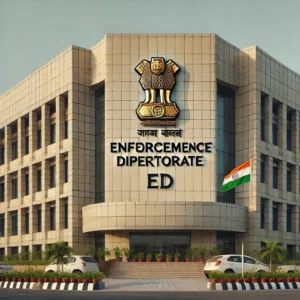The Enforcement Directorate (ED) is a specialized financial investigation agency under the Department of Revenue, Ministry of Finance, Government of India. Established in 1956, the ED’s primary responsibility is to enforce two key laws: the Prevention of Money Laundering Act (PMLA), 2002, and the Foreign Exchange Management Act (FEMA), 1999. Its primary functions include investigating and prosecuting cases related to money laundering, foreign exchange violations, and financial crimes with cross-border implications. The agency plays a critical role in curbing illegal financial activities, including the movement of black money, terror financing, and other economic offenses that undermine national security and financial stability. ED officers have the power to attach properties, arrest offenders, and conduct raids as part of their investigative processes. The ED has been increasingly active in high-profile cases, often involving influential individuals and large corporate entities, making it a key player in India’s fight against financial corruption.

CONSTITUTIONAL PROVISION FOR ENFORCEMENT DIRECTORATE
The Enforcement Directorate (ED) operates under several legal frameworks that, while not directly enshrined in the Indian Constitution, derive their authority from various legislative acts and constitutional provisions aimed at maintaining financial stability, preventing crime, and safeguarding the economy. Some of the key constitutional provisions related to the ED’s functioning are:
- Article 246 (Seventh Schedule) – This article outlines the division of powers between the Union and State governments. The ED enforces laws that come under the Union List, particularly related to criminal law, money laundering, and foreign exchange, which are under central jurisdiction.
- Article 300A (Right to Property) – The ED has the authority to attach properties in cases involving proceeds of crime under the Prevention of Money Laundering Act (PMLA), 2002. This can sometimes involve property seizures, though the right to property is protected under Article 300A. However, seizures must follow due process under laws like PMLA.
- Article 21 (Right to Life and Personal Liberty) – ED’s investigations and actions, such as arrests and detentions, must comply with Article 21, which ensures that no individual is deprived of life or personal liberty except according to the procedure established by law.
- Article 32 (Right to Constitutional Remedies) – Individuals or entities affected by ED actions have the right to approach the Supreme Court or High Courts if they believe that their fundamental rights have been violated.
- The ED draws its investigative powers primarily from legislative acts such as the Prevention of Money Laundering Act (PMLA), 2002, and the Foreign Exchange Management Act (FEMA), 1999, which are enacted by Parliament under its legislative powers.
In conclusion, the Enforcement Directorate (ED) serves as a vital pillar in India’s fight against financial crimes, particularly in curbing money laundering, foreign exchange violations, and other illicit economic activities that threaten the country’s financial integrity. Through its enforcement of key legislation like the Prevention of Money Laundering Act (PMLA) and the Foreign Exchange Management Act (FEMA), the ED plays a crucial role in preserving economic stability and deterring illegal practices. While its actions often involve high-profile investigations, the ED must balance its mandate with adherence to legal and constitutional protections, ensuring that its powers are exercised within the framework of due process and individual rights. As India’s economy grows and becomes increasingly interconnected with global markets, the ED’s role in safeguarding national interests will remain more relevant than ever.


